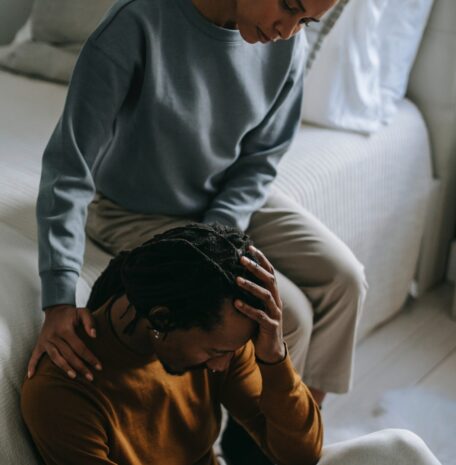Grief Counseling
Have you experienced a loss that has left you feeling confused and disoriented?
Maybe your loss isn't one that is recognized by family and friends?
Divorce, a breakup, loss of a friendship, or even the death of a pet can bring feelings of grief.
Navigating grief and loss won't feel overwhelmingly sad forever.
Our therapists can help you process your feelings and emotions that arise during your grieving process.
Feeling stuck in the web of grief can hold you back from living your life, or even leave you feeling guilty.
We can support you in feeling emotionally stable while continuing to live your life.
It's possible for you to learn how to effectively move through stages of grief in your own time.
Individual counseling for grief can help...
Which of the following sound true for you?
SELF ASSESSMENT FOR ANXIETY

How to Get Started with Grief Counseling:
Getting started is as simple as completing our 5-minute
Intake Pre-screen where you will:
- Briefly share with us why you're seeking services and your presenting concerns.
- Complete a brief risk assessment to ensure you're not at risk for harm to yourself or others.
- Schedule your initial appointment, or a complimentary 15-minute consultation, to ensure you are connecting to the service and provider that’s the best fit for you immediately after you submit your Intake Pre-screen.
Frequently Asked Questions (FAQS)
Absolutely, grief can come from the loss of any relationship. For some people, pets are considered loved ones who are part of the family. Just because others don’t understand your feelings about the loss of your pet, it doesn’t mean your feelings aren’t valid. A therapist can provide a caring and nonjudgmental space for you to process your feelings of grief due to the loss of your pet.
Yes! Though we often talk about grief and loss in the context of death, these feelings can come from a variety of types of loss. Sometimes these feelings come from disconnection from a loving or close relationship. That means that any disconnection from an important relationship, whether it be due to death, moving, divorce, estrangement, can result in feelings of grief and loss. Some people may even experience grief about “what could have been” with a person they didn't have the chance to continue a relationship with. Whether it be the loss of a friendship, romantic relationship, or any other type of relationship, your feelings are valid.
Maybe. It is absolutely possible to grieve losses that aren’t related to relationships. For example, you may grieve the loss of employment, stable income, housing, reliable transportation, and more. We say maybe because grief is often about the feelings you experience related to a loss. You can schedule an appointment with one of our provider to explore whether you are experiencing grief or some other reaction to your recent experience.
These terms are related and interconnected. They are also sometimes used interchangeably. In the mental health field, we often explain grief, loss, and mourning as being a bit different.
- Loss is the actual experience.
- Grief is thought of as someone’s emotional reaction to loss.
- Finally, mourning is described as the actions that externally show grief.
For example, if a loved one dies (loss), someone might feel angry and sad (grief), and they may attend the person’s funeral (mourning) to help them heal. Additionally, there are a variety of different types of grief which may have similar or different expressions of mourning.
The experience of grief is different for everyone. And, one person may not experience grief the same way every time. Grief is a normal reaction to loss and you may experience periods of sadness and even grief (this is common during anniversaries and holidays) for a long time after experiencing a loss.
If grief is still significantly impacting your life after 1 year (or 6 months for children), then that may be a sign of prolonged grief which you can get help for. However, getting support for grief and even your grieving process isn’t on a timeline. If you want help exploring your grieving process, complete our Intake Pre-screen today to schedule with one of our providers.
No, not at all. Most of us experience a variety of losses throughout our lives. Remember, grief is a natural reaction to loss. You may navigate your grief with support from family, friends, community, faith leaders, mourning practices, or in a variety of other ways. You may also want the support of a therapist, and that’s okay too.
You can explore the option of working with one of our providers by completing the Intake Pre-screen and scheduling a session or complimentary call.




